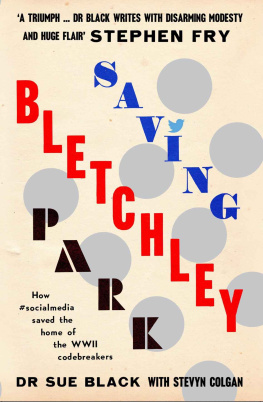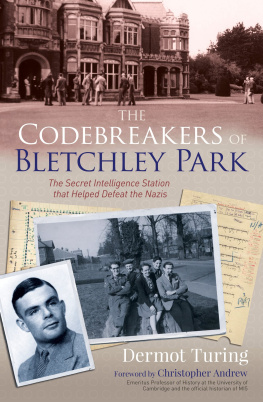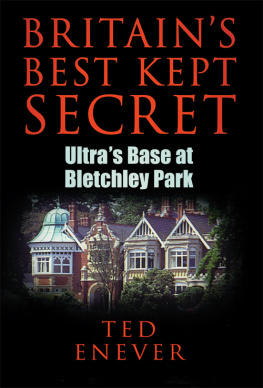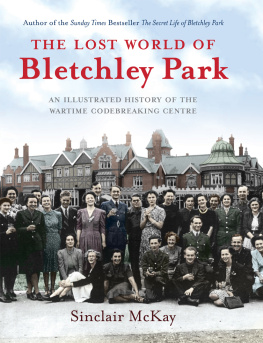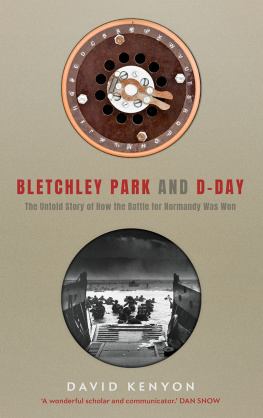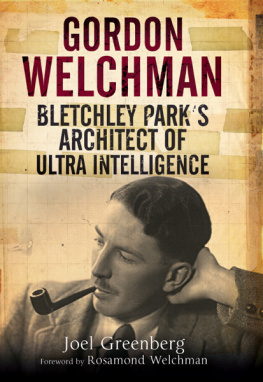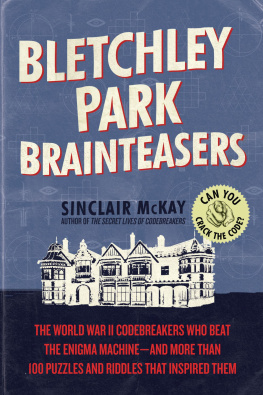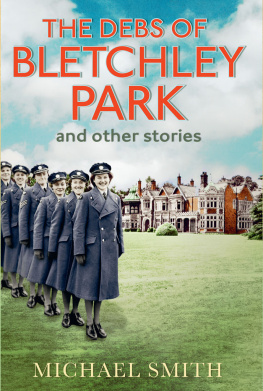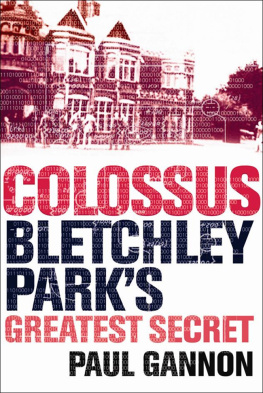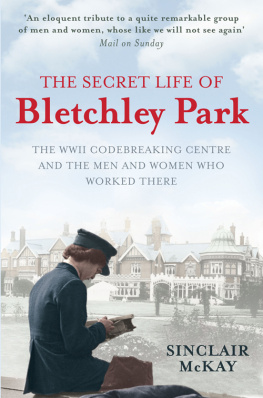
Saving Bletchley Park
Dr Sue Black
Stevyn Colgan
Dear Reader,
The book you are holding came about in a rather different way to most others. It was funded directly by readers through a new website: Unbound.
Unbound is the creation of three writers. We started the company because we believed there had to be a better deal for both writers and readers. On the Unbound website, authors share the ideas for the books they want to write directly with readers. If enough of you support the book by pledging for it in advance, we produce a beautifully bound special subscribers edition and distribute a regular edition and e-book wherever books are sold, in shops and online.
This new way of publishing is actually a very old idea (Samuel Johnson funded his dictionary this way). Were just using the internet to build each writer a network of patrons. Here, at the back of this book, youll find the names of all the people who made it happen.
Publishing in this way means readers are no longer just passive consumers of the books they buy, and authors are free to write the books they really want. They get a much fairer return too half the profits their books generate, rather than a tiny percentage of the cover price.
If youre not yet a subscriber, we hope that youll want to join our publishing revolution and have your name listed in one of our books in the future. To get you started, here is a 5 discount on your first pledge. Just visit unbound.com, make your pledge and type SAVETHEPARK in the promo code box when you check out.
Thank you for your support,

Dan, Justin and John
Founders, Unbound
Contents
This book is dedicated to my little brother Stephen Richard Ambury who died during the campaign, to my best friend Hazel Jean Lapierre who died during the writing of this book, and to everyone who worked at Bletchley Park during WWII. Thank you all from the bottom of my heart.
Introduction
I n April 2003 I made my first visit to Bletchley Park, the home of the codebreakers. Like many people, I knew very little about what had happened there. I certainly didnt know that more than 10,000 people had worked there during WWII, or that more than half of them were women, and young women at that; many of them were away from home for the first time. I also didnt know that the secret code breaking work carried out there had shortened the war by approximately two years, and at that time 11 million people per year were dying. This means there were potentially 22 million lives saved as a result of activities conducted at Bletchley Park.
22 million. Lives. Saved. Why did I, and so many others, know nothing about these amazing achievements?
Over the next ten years I learned much more about what had happened at Bletchley Park, and, amazingly, got to meet many of the people who made it happen. I went away after my first trip wanting to raise awareness of the achievements of the women who had worked at Bletchley Park the Women of Station X. (Bletchley was the tenth listening station, hence the X.)
Bletchley Park had got under my skin. But my interest in what had happened there, and the amazing contributions made by the thousands of people who worked there, contrasted starkly with the state of the site as it was at the time.
In 2008 I found out that Bletchley Park was, according to CEO Simon Greenish, teetering on a financial knife edge. I thought, frankly, that this was a disgrace, and set out to do something about it. Campaigning to save Bletchley Park took over my life for the next three years. There was hardly a waking moment when I wasnt either taking action to raise awareness or thinking about how to get more people on board with the campaign. Looking back now, it seems like an obsession. At the time it just felt like an amazing whirlwind of energy and excitement; I was on a roller coaster ride. Im very lucky that my family and friends supported me during that ride and even came along with me for parts of it.
Im often asked what the major turning points were in the campaign. Its hard to pick just one, but if I had to I would say that for me the biggest turning point was working out how to use Twitter, and then using it to help build a massive community of love, support and goodwill towards Bletchley Park. Without it, I dont think we would have been nearly as successful as we were.
For years, whenever I mentioned Twitter and how it was a real catalyst for the campaign, I would get the same response: I dont care what you had for breakfast! For some reason, rather than embrace this new exciting medium, most people seemed to have decided that it was all about being vain and telling everyone the most mundane details of your life.
Not many people in the UK were using Twitter in 2008, but those who did were part of an exciting crowd of early adopters who I now feel very privileged to call friends. Many of these people became key influencers in the campaign. They are the ones that made all the difference with their enthusiasm, expertise, energy and, crucially, their response to a rallying call: we must save Bletchley Park .
Thankfully, Bletchley Park is now safe. I visited again in June 2014 to see the opening of the new visitor centre by the Duchess of Cambridge, whose grandmother and great aunt had worked there during the war. It was truly wonderful to see the newly restored huts and visitor centre, and to see the press there, jostling for position from behind cordons. At that time, Bletchley Park was on the front pages of national and international papers; just a few years earlier I had struggled to get any journalists interested enough to write a story about it at all.
This book is a personal story of how I started a campaign to save Bletchley Park, and of how hundreds, if not thousands, of people joined me to help save a site of fundamental international importance. This was a place where thousands of people worked around the clock for years on end, with no thanks at all, in the strictest secrecy. Many of the veterans of Bletchley Park never told anyone at all what they had done and most of them received no reward. But what they did, and how they did it, ensured that we can enjoy the freedom we have today. We cannot thank them all now most of them unfortunately are no longer with us. But we can preserve and cherish the place where they carried out their amazing work and ensure that our children, grandchildren and all future generations have the opportunity to get a glimpse of history, see what it was like, and hear the stories: of decoding messages straight from Hitler, of schoolgirls, away from home for the first time, arriving to work at Bletchley; of now famous codebreakers and inventors like Alan Turing, Bill Tutte and Tommy Flowers; of nicking the vicars bicycle to go to a dance or sunbathing topless on the roof at Woburn Abbey. There are so many stories, so many of which were erased.
So lets treasure Bletchley Park and the people who worked there, and lets put those stories back into our history. Lets celebrate what we do have. Those stories are part of our heritage and should be taught to children in the UK and across the world.
We owe it to the people whose work saved 22 million lives.
Sue Black
London, September 2015
When the last members of staff left the Bletchley Park estate in 1945, they probably didnt give much thought as to what would happen to it. The war was over and the work that they had been doing was so secret that they undoubtedly believed that no one would ever know what had gone on behind those gates. Seven decades later, we now know a great deal about the extraordinary code breaking work that was done at Bletchley Park. However, what isnt so well known is what happened after those gates shut both immediately after the war and in the 70 years since. This book tells the story of Bletchley Parks wartime activities plus, for the first time, the lesser known but equally fascinating story of how BP, as it was known to those who worked there, was saved for the nation. But before we begin, lets look briefly at what happened between 1945 and 1991, when one story ends and the other begins.
Next page
